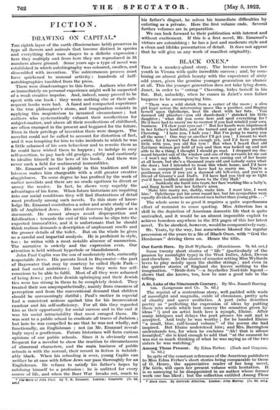FICTION.
DRAWING ON CAPITAL.*
Thu eighth layer of the earth (Rosicrucians held) preserves in type all flowers and animals that become distinct in species
and everything that man shapes to a definite expression : here they multiply and from here they are reproduced in fit numbers above ground. Some years ago a type of novel was established in which autobiography was coloured, swollen, and dissembled with invention. The subterranean process must have quickened to unusual activity : hundreds of half- autobiographies tumbled from the press.
There were disadvantages to this form. Authors who drew ao immediately on personal experience might well be suspected of a weak creative impulse. And, indeed, many proved to be spent with one book : they wrote nothing else or their sub- sequent books were bad. A fused and compacted experience is the true philosopher's stone, and imagination consists in applying this magisteriurn to invented circumstance ; but authors who systematically exhaust their recollections for subject-matter, and above all their recollections of childhood, are often cramped in the present and beggared for the future. Even in their privilege of invention there were dangers. The novelist could not be called to account for distortion of fact, and it was tempting for him to take incidents in which he was a little ashamed of his own behaviour and to rewrite them as he could have wished them to happen ; to indulge in easy self-assertion, to pay back old grudges, subtly and cautiously to idealize himself in the hero of his book. And there was never such a field for sentimental immoralities.
Mr. Emanuel's novel is plainly in this tradition and his lateness makes him chargeable with a still greater creative sluggishness. To some degree he has profited by the work of earlier novelists and there are no crude egotisms to divert or annoy the reader. In fact, he shows very capably the advantages of his form. When future historians are inquiring into our social conditions they will find illustrations of detail most profusely among such novels. To this store of know- ledge Mr. Emanuel contributes a sober and acute study of the life of Anglicized Jews. His novel deserves high praise as a document. He cannot always avoid disproportion and falsification : towards the end of this volume he slips into the expected immoralities, and it is unfortunate that he should think realism demands a description of unpleasant smells and the grosser details of the toilet. But on the whole he gives us a careful and impartial analysis. He is proficient in style, too : he writes with a most notable absence of mannerism. The narrative is orderly and the expression even. Our attention is held without hyperbole or blandishment.
John Paul Caplin was the son of moderately rich, eminently respectable Jews. His parents lived in Bayswater—the part of Bayswater that may by courtesy be called Hyde Park— and had social ambitions ; but these they were too self- conscious to be able to fulfil. Most of all they were ashamed of being Jews ; yet their Jewish upbringing and their Jewish tics were too strong in them to be completely denied. They treated their son unsympathetically, mainly from crassness of perception and from the conventional demand that children should be unreasoningly dutiful ; Paul's mother in especial had a consistent animus against him for his inconvenient candour and his self-sufficiency. For all this they regarded him as their opportunity for social success and in the end it was his social intractability that most enraged them. He was sent to a public school to eradicate all traces of Judaism ; but here he was compelled to see that he was not wholly, not functionally, an Englishman ; not (as Mr. Emanuel reveal- ingly says) a gentleman. Future historians will form curious opinions of our public schools. Since it is obviously most frequent for a novelist to show the reaction to circumstances of abnormal characters, and the main business of public schools is with the normal, their record in fiction is indubit- ably black. When his schooling is over, young Caplin can neither be at ease with fellow Jews nor pass thoroughly for an Englishman. He refuses to satisfy his father's hopes by subduing himself to a profession : he is unfitted for every course of life, and when the Boer War breaks out, much to
• TM Sara of John Paul. By V. B. Emanuel. London: Constable [78. 8c1. ad.)
his father's disgust, he solves his immediate difficulties by enlisting as a private. Here the first volume ends. Several further volumes are in preparation.
We can look forward to their publication with interest and without excitement. If this is a first novel, Mr. Fananuel's virtues are astonishing : he has a just and moderate style and a clean and lifelike presentation of detail. It does not appear that he will give us any work of manifest originality.














































 Previous page
Previous page